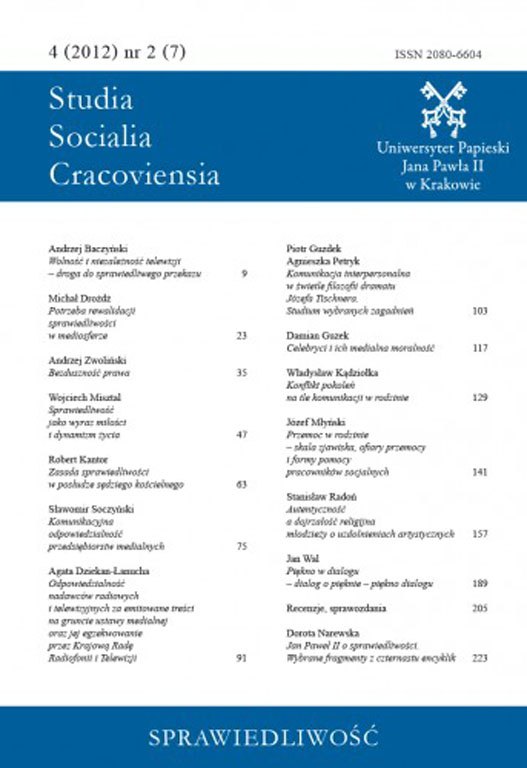Komunikacja interpersonalna w świetle filozofii dramatu Józefa Tischnera. Studium wybranych zagadnień
DOI:
https://doi.org/10.15633/ssc.413Słowa kluczowe:
filozofia dramatu, filozofia mediów, fenomenologia, komunikacja interpersonalna, personalizmAbstrakt
Pytanie, co to znaczy być istotą dramatyczną odpowiada pytaniu, kim jest człowiek mediów i na czym polega jego bytowanie. Akt komunikacji interpersonalnej osób jest czynem dramatycznym, zakorzenionym w ludzkiej egzystencji, która również jest egzystencją dramatyczną. Autorzy artykułu analizują rzeczywistość komunikacji interpersonalnej z perspektywy filozofii dramatu Józefa Tischnera. W swoich poszukiwaniach odwołują się także do personalistycznego paradygmatu filozofii mediów.Pobrania
Opublikowane
2012-12-31
Numer
Dział
Rozprawy, opracowania
Licencja
Prawa autorskie (c) 2012 Piotr Guzdek, Agnieszka Petryk

Praca jest udostępniana na licencji Creative Commons Attribution-NonCommercial-NoDerivatives 3.0 Unported License.
Autorzy publikujący w czasopiśmie udzielają jego wydawcy zgody o następującej treści:
- Autor zachowuje autorskie prawa majątkowe do utworu, a jednocześnie udziela wydawcy czasopisma zgody na jego pierwszą publikację w wersji drukowanej i wersji online na licencji Creative Commons Uznanie autorstwa 4.0 Międzynarodowe oraz zgody na wykonywanie opracowań, w tym przekładów.
- Autor ma możliwość udzielania zgody niewyłącznej na opublikowanie utworu w wersji, która ukazała się w czasopiśmie (np. zamieszczenia go w repozytorium instytucjonalnym lub opublikowania w książce), wraz z informacją o jego pierwszej publikacji w czasopiśmie.
- Autor może umieścić swój utwór online (np. w repozytorium instytucjonalnym lub na swojej stronie internetowej) jeszcze przed zgłoszeniem utworu do czasopisma.

